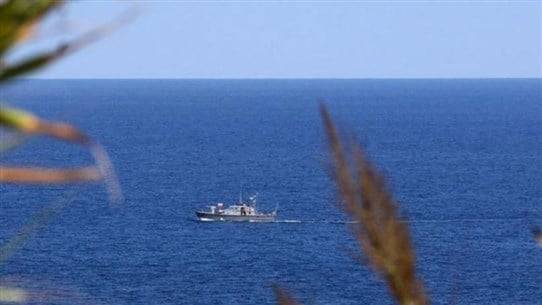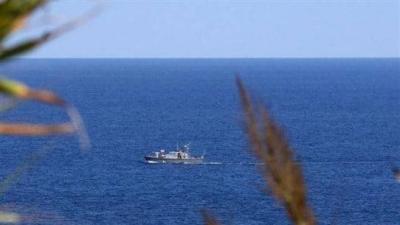Lebanon is moving towards resolving the longstanding border dispute with Cyprus, which will not be settled until the maritime dispute with Syria is resolved, according to Deputy Speaker of Parliament Elias Bou Saab who met with a Cypriot delegation visiting Beirut yesterday, Friday, the day after the signing of the border demarcation agreement between Lebanon and Israel. In 2007, Lebanon and Cyprus reached a temporary bilateral agreement that can be amended to delineate the economic exclusive zones based on the median line for both countries, which did not involve Syria. The coordinates were modified in 2006, with Lebanon's northern border changing from point 6 to point 7, and the southern border from point 1 to point 23. Cyprus reached a bilateral agreement with Israel, which created points of contention with Cyprus.
It is now possible to resolve the border crisis with Cyprus, adjacent to the maritime borders of Lebanon and Israel, after reaching an agreement between the two sides, specifically determining the border point (23) where the borders of the three countries meet in the south, while the northwestern border point of Lebanon remains unresolved, pending the resolution of the border dispute with Syria. A Cypriot delegation held talks in Lebanon regarding the maritime border demarcation between the two countries, and Cypriot Special Envoy Tassos Tzionis stated after meeting with Lebanese President Michel Aoun: "There is no problem between Lebanon and Cyprus that cannot be easily resolved." He explained: "We are very optimistic that after the technical work is completed, we will settle all maritime demarcation issues, which is not difficult, and the timing is very appropriate, and this is what our two countries need as they have initiated work to explore in the sea and require more investments."
President Aoun, for his part, stated that "the purpose of the meeting is to agree on addressing the pending issue of delineating maritime borders after we completed the demarcation of the southern maritime border." He considered that "between Lebanon and Cyprus, there is no need for a mediator as we are neighboring friendly countries, which makes our task easier in clearing up the arising ambiguities."
Deputy Speaker of Parliament Elias Bou Saab announced after the Cypriot delegation's meeting with President Aoun on maritime border demarcation between Lebanon and Israel: "We discussed the points that were pending between the Lebanese Republic and Cyprus," noting that "the Cypriot delegation requested to meet us after agreeing on point 23 regarding the southern borders." He confirmed that "the points that will remain pending are those related to the northern demarcation, which is why we requested to communicate with Syria again," stressing that "we will not finalize the file with Cyprus until we reach an agreement with Syria; because that is what happens between friendly countries."
Regarding the misunderstanding that occurred in the Lebanese delegation’s planned visit to the Syrian capital last Wednesday, which was postponed by Damascus, Bou Saab clarified that "there was no miscommunication with Syria, but rather a misunderstanding," pointing out that misunderstandings happen among brothers, and the issue with Syria will be resolved with no problems, indicating that "the error did not occur on our part, and cooperation will be present."
Bou Saab paved the way for the Cypriot delegation's meeting with the Minister of Works in the caretaker government, Ali Hamie, by stating that "efforts will be made to find a solution to the differences in opinions," emphasizing that "cooperation with Cyprus is not like cooperating with an enemy state, and this accelerates the process."
The border dispute with Cyprus saw Lebanon and Cyprus reach a temporary and amendable bilateral agreement on January 17, 2007, to delineate the economic exclusive zones along the median line for both countries without definitively determining the coordinates of the two endpoints of this line, as this requires a tripartite demarcation involving both countries (Lebanon and Cyprus) alongside Syria to the north, which they refused to participate in, according to Lebanese officials involved at that time, and with Israel to the south. The draft agreement explicitly stated that geographic coordinates for points (1 and/or 6) could be reviewed or amended as needed in light of future determinations of exclusive economic zones with other neighboring countries involved. The agreement signed between Lebanon and Cyprus stipulated that any party must inform the other and consult with it prior to reaching a final agreement with any other state regarding the coordinates of points (1) or (6).
The Lebanese government did not submit the temporary agreement with Cyprus to the parliament due to the need to complete defining Lebanon's final borders both south and north, as well as to conduct further studies. The government began individually completing the delineation of the northern and southern economic exclusive zones. At the end of 2008, upon the request of the Minister of Energy and Water, a committee was formed comprising the Prime Minister's office, the Ministry of Public Works and Transport, the Ministry of Energy and Water, the Ministry of Defense, the Ministry of Foreign Affairs and Emigrants, the Lebanese Army, and the National Council for Scientific Research.
The committee reached a consensus in April 2009, with all members signing the delineation of the maritime borders to the south and north, making the southern end point 23, south of point 1, and the northern end point 7, north of point 6. In July 2010, Lebanon submitted the coordinates of its southern exclusive economic zone to the United Nations unilaterally, and also submitted the coordinates of the northern border with Syria at point 7. However, Cyprus signed an agreement with Israel in December 2010 to delineate the exclusive economic zone between them, without informing or consulting the Lebanese state, contrary to their agreement, just five months after Lebanon had submitted the coordinates of points 23 and 7 to the UN.
The Lebanese government protested this agreement in a letter to the UN Secretary-General in June 2011, due to Israel adopting point "1" as a separation point between Lebanon and Israel, instead of point "23," which the Lebanese government (under Prime Minister Fouad Siniora) had defined in 2008. Discussions followed with the Cypriot side, but they awaited the conclusion of a maritime border agreement with Israel and Syria to resolve the points completely.




